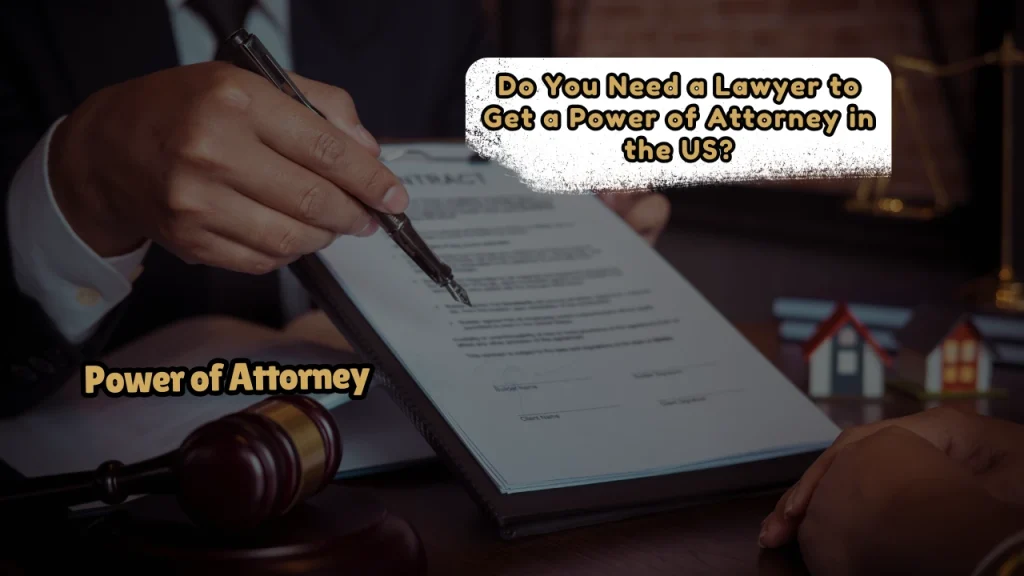Do You Need a Lawyer to Get a Power of Attorney in the US?
No, you don’t legally need a lawyer to create a valid power of attorney (POA) in the US. Most states provide statutory forms or templates that individuals can use to draft their own documents. However, while DIY options work for straightforward situations, consulting a lawyer is often recommended in complex cases.
Table of Contents
Why a POA Is Essential?
Imagine a scenario where an elderly parent suddenly becomes unable to manage daily affairs due to illness or accident. A power of attorney enables a trusted agent to handle financial, healthcare, or legal decisions on their behalf. But do you really need a lawyer to set one up? This article explores both DIY options and when legal guidance becomes critical.
Understanding Power of Attorney
A power of attorney is a legal document that designates an agent (or agents) to act on behalf of the principal. There are several types of POA:
- General POA: Grants broad authority over many decisions.
- Durable POA: Remains valid even if the principal becomes incapacitated.
- Financial POA: Focuses on managing assets, taxes, and property.
- Healthcare POA: Authorizes the agent to make medical decisions.
DIY Options for Creating a POA
State-Specific Templates
Many states offer statutory forms. For example:
- New York and Maryland offer statutory short-form POAs that comply with state laws.
- Each state may have its own witnessing and notarization requirements.
Basic Steps
- Signature, Notarization, and Witnesses: Generally, a POA requires the principal’s signature, notarization, and witnesses (requirements vary by state).
- Online Services: Platforms like Trust & Will or BlueNotary provide customizable, state-specific POA templates for under $50.
Note: Ensure the document meets your state’s rules. For instance, Maryland requires two witnesses and notarization to avoid invalidation.
Related article for you:
Do You Need a Lawyer to Get a Power of Attorney in New York?
When to Consider a Lawyer
While DIY options work for simple cases, legal guidance is recommended in complex scenarios. Consider hiring an attorney if you have:
- High-Value or Complex Assets: Managing real estate, investments, or business interests often requires precise language to prevent misuse or disputes.
- Blended Families or Conflicts: Lawyers can draft clauses to mitigate family disputes, especially if agents might act against the principal’s wishes.
- Multiple or Co-Agents: Appointing siblings or multiple agents requires clarity on whether they must act jointly or independently to avoid delays or conflicts.
- Healthcare vs. Financial POAs: Separating medical and financial authority into distinct documents may require legal expertise to ensure compliance with state laws.
- Springing or Durable POAs: Ensuring a “springing” POA (effective only upon incapacity) meets state triggers (e.g., physician certification) often benefits from legal review.
Lawyers help avoid common pitfalls, such as vague language or improper execution, which could render the POA unenforceable.

DIY Success: When to Proceed Without a Lawyer
For straightforward needs, self-drafted POAs can be practical:
- Limited or Specific Tasks: Temporary POAs for a single transaction (e.g., selling a car) can often use state-provided forms.
- Trusted Agents: If designating a spouse or close family member with clear instructions, templates usually suffice.
- Cost Savings: DIY options typically cost under $50 for templates, plus minimal fees for notarization and filing, compared to $150–$500+ for legal fees.
Key Steps for DIY:
- Use State-Compliant Forms: Ensure the template aligns with your state’s witnessing and notarization rules.
- Define Powers Clearly: Specify whether the agent can manage bank accounts, sell property, or make healthcare decisions.
- Notarize and Distribute: File the POA with relevant institutions (e.g., banks) to ensure acceptance.
Important Considerations in the Process
While you do not necessarily need a lawyer, complex situations might benefit from professional guidance. For instance, if you are considering a POA for an elderly parent with dementia, you might explore further details in our guide on How to Get Power of Attorney for an Elderly Parent with Dementia?
Risks of DIY POAs
Without legal assistance, mistakes in self-drafted POAs can lead to costly issues:
- Invalidation: Missing notarization or witnesses may void the document.
- Ambiguity: Overly broad language might grant unintended powers, risking financial abuse.
- Institutional Rejection: Banks or hospitals may reject poorly drafted POAs, delaying critical decisions.
- Post-Incapacity Challenges: Springing POAs without clear triggers (e.g., proper physician certification) may lead to disputes.
Cost-Benefit Analysis
- Lawyer Fees: Typically range from $150 to $500+ for tailored advice, compliance checks, and dispute prevention.
- DIY Costs: Generally under $50 for templates, plus notarization (around $10–$20) and potential filing fees.
- Hidden Costs: Errors in DIY POAs may result in court intervention or guardianship proceedings, which are far more expensive.
Conclusion
While a lawyer isn’t legally required to create a POA in the US, professional guidance is invaluable for complex estates, high-stakes decisions, or contentious family dynamics. For simple cases, state templates and online services offer a cost-effective solution—provided you meticulously follow execution rules. Evaluate your needs, consult free resources (e.g., state bar associations), and weigh the risks to make an informed choice.
Disclaimer: This article provides general information and not legal advice. Consult an attorney for guidance tailored to your situation.
About the Author

Sarah Klein, JD, is an experienced estate planning attorney who has helped clients with wills, trusts, powers of attorney, and probate matters. At All About Lawyer, she simplifies complex estate laws so families can protect their assets, plan ahead, and avoid legal headaches during life’s most sensitive moments.
Read more about Sarah
